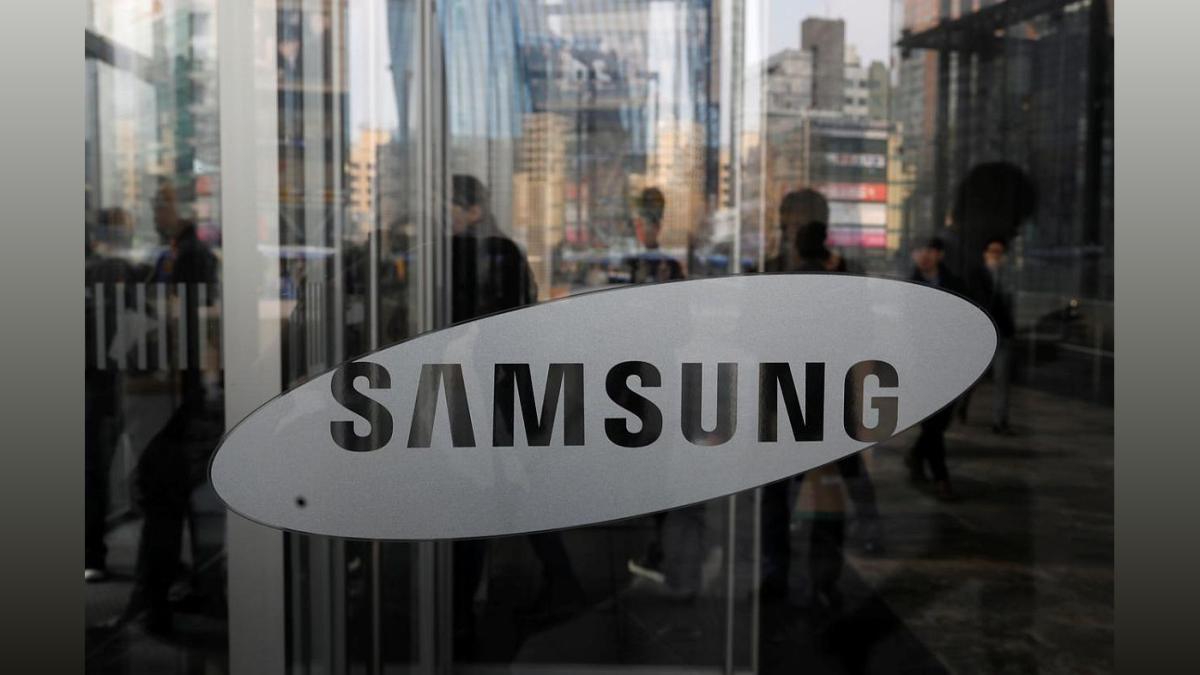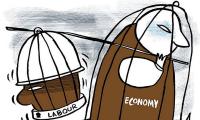Protect Workers && Manufacturers: GTRI Urges Clear Laws
Economic think tank GTRI suggests clear laws and SOPs to protect workers and manufacturers' interests, aiming for a stable industrial environment in India. The organization highlights the need for efficient mediation systems and union-management dialogue to prevent strikes and promote industrial...

Photograph: Kim Hong-Ji/Reuters
New Delhi, Oct 6 (PTI) The government needs to focus on formulating clear laws, and standard operating procedures to protect workers and interests of companies to foster a more stable industrial environment in the country, economic think tank GTRI has suggested.
It also said that to reduce industrial strikes, India must prioritize protecting workers' rights while maintaining industrial stability and there is an urgent need to take steps to help address labour disputes before they escalate into strikes.
"Industrial strikes have led to factory closures and job losses in India for decades," GTRI founder Ajay Srivastava said, adding that the strike by over 1,000 workers at Samsung's Sriperumbudur factory in Tamil Nadu since September 9 is not an isolated event.
He suggested seven steps that includes enforcement of labour laws, setting up mediation systems, union-management dialogue, legal framework for labour compliance, collaboration between centre and states on the subject, and intelligence to detect disruptions.
"The government must enforce labour laws ensuring written contracts, severance pay, and regulated working hours for workers. This enforcement would provide a safety net for workers and reduce grievances that often lead to strikes," the Global Trade Research Initiative (GTRI) said.
It said that creating efficient mediation and arbitration systems would allow disputes to be resolved quickly, preventing them from escalating into large-scale strikes.
These systems could be managed by independent bodies to ensure fairness.
It added that unions should be involved in discussions on wages and worker welfare but should not interfere with individual company operations.
"A balanced approach would prevent unions from stalling industrial progress while ensuring worker rights are protected," it said adding a clear legal framework outlining manufacturers' obligations for labour compliance and worker welfare would create a more predictable business environment.
It said that by implementing these strategies, India can reduce the frequency and impact of labour strikes, thereby fostering a more stable industrial environment that benefits both workers and businesses.
Srivastava said that since the 1970s, India has witnessed hundreds of strikes in industrial hotspots such as Maharashtra, Gujarat, Haryana, West Bengal, Kanpur, and Punjab.
"Textiles was the top industry in the 1970s and 1980s when India was competing with China. However prolonged labour strikes have turned cities like Kanpur, Mumbai and many others as graveyards of the textiles industry," he said adding the suggestions will help in recurrence of such incidents in the country.
Citing Chinese examples, he said China's single trade union, the All-China Federation of Trade Unions (ACFTU), works closely with the government to manage worker grievances, preventing widespread unrest.
"In contrast, India's trade unions are often linked to political parties, leading to strikes driven by political motives," he added.
It also said that to reduce industrial strikes, India must prioritize protecting workers' rights while maintaining industrial stability and there is an urgent need to take steps to help address labour disputes before they escalate into strikes.
"Industrial strikes have led to factory closures and job losses in India for decades," GTRI founder Ajay Srivastava said, adding that the strike by over 1,000 workers at Samsung's Sriperumbudur factory in Tamil Nadu since September 9 is not an isolated event.
He suggested seven steps that includes enforcement of labour laws, setting up mediation systems, union-management dialogue, legal framework for labour compliance, collaboration between centre and states on the subject, and intelligence to detect disruptions.
"The government must enforce labour laws ensuring written contracts, severance pay, and regulated working hours for workers. This enforcement would provide a safety net for workers and reduce grievances that often lead to strikes," the Global Trade Research Initiative (GTRI) said.
It said that creating efficient mediation and arbitration systems would allow disputes to be resolved quickly, preventing them from escalating into large-scale strikes.
These systems could be managed by independent bodies to ensure fairness.
It added that unions should be involved in discussions on wages and worker welfare but should not interfere with individual company operations.
"A balanced approach would prevent unions from stalling industrial progress while ensuring worker rights are protected," it said adding a clear legal framework outlining manufacturers' obligations for labour compliance and worker welfare would create a more predictable business environment.
It said that by implementing these strategies, India can reduce the frequency and impact of labour strikes, thereby fostering a more stable industrial environment that benefits both workers and businesses.
Srivastava said that since the 1970s, India has witnessed hundreds of strikes in industrial hotspots such as Maharashtra, Gujarat, Haryana, West Bengal, Kanpur, and Punjab.
"Textiles was the top industry in the 1970s and 1980s when India was competing with China. However prolonged labour strikes have turned cities like Kanpur, Mumbai and many others as graveyards of the textiles industry," he said adding the suggestions will help in recurrence of such incidents in the country.
Citing Chinese examples, he said China's single trade union, the All-China Federation of Trade Unions (ACFTU), works closely with the government to manage worker grievances, preventing widespread unrest.
"In contrast, India's trade unions are often linked to political parties, leading to strikes driven by political motives," he added.
You May Like To Read
TODAY'S MOST TRADED COMPANIES
- Company Name
- Price
- Volume
- Vodafone-Idea-L
- 11.36 ( -2.49)
- 94664837
- AvanceTechnologies
- 1.16 (+ 4.50)
- 34522155
- Sunshine-Capital
- 0.26 ( -3.70)
- 29015901
- Alstone-Textiles
- 0.27 ( -3.57)
- 28695959
- Mehai-Technology
- 1.65 ( -4.62)
- 28262795






